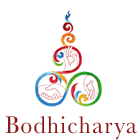The teaching on Five Wisdoms was given at White Tara Group in Oxford, UK.
There are two words for wisdom in Tibetan: yeshe and sherab.
Ye means something that has been always there; primordially, naturally.
She means knowing, seeing, understanding, awareness.
Rab means the best, the highest.
Sherab: The actualised, best view of how things really are. Yeshe: How it’s always already been that way.
When you develop sherab, or awaken your sherab, you will experience yeshe, sometimes called as the primordial or pristine wisdom.
Klesha and karma, said the Buddha, are the cause of our suffering.
Kleshas are the negative emotions, sometimes categorised as five mind poisons.
There are mainly three ways of dealing with kleshas: letting go, transforming, understanding.
By directly understanding and seeing the nature of the afflictions as they arise and dissolve, it is transformed into wisdom.
Then we will see that there was nothing really wrong. The confusion only came from our wrong way of seeing, a misunderstanding, a wrong identification. When we understand this deeply and directly, that is called selfliberation. The problem dissolves by itself, we don’t have to try to get rid of it. A realisation that it was always OK. I just didn’t see things clearly.
When someone becomes enlightened like this, he or she is called Vajradhara or Samantabhadra – the primordial Buddha, the first Buddha – because when I understand this nature of myself directly and experientially, it’s not that I feel that now today at last I got enlightened, but I recognise that I was always enlightened. There was nothing wrong with me. I’ve always been enlightened but I didn’t know!
That can only be so, if you recognise the Five Wisdoms, or The Wisdom.

